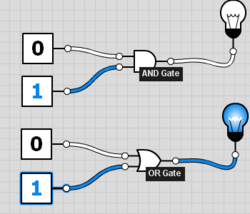Logic gate (nonfiction): Difference between revisions
Jump to navigation
Jump to search
No edit summary |
|||
| (One intermediate revision by the same user not shown) | |||
| Line 20: | Line 20: | ||
== Fiction cross-reference == | == Fiction cross-reference == | ||
* [[Crimes against mathematical constants]] | |||
* [[Gnomon algorithm]] | |||
* [[Gnomon Chronicles]] | |||
== Nonfiction cross-reference == | == Nonfiction cross-reference == | ||
* [[Boolean logic (nonfiction)]] | * [[Boolean logic (nonfiction)]] | ||
* [[Computer science (nonfiction)]] | |||
* [[Logic (nonfiction)]] | * [[Logic (nonfiction)]] | ||
* [[Toffoli gate (nonfiction)]] | * [[Toffoli gate (nonfiction)]] | ||
Latest revision as of 09:27, 2 July 2019
In electronics, a logic gate is an idealized or physical device implementing a Boolean function.
That is, it performs a logical operation on one or more logical inputs, and produces a single logical output.
All of the principles of Boolean logic can be expressed as logic gates.
With amplification, logic gates can be cascaded in the same way that Boolean functions can be composed, allowing the construction of a physical model of Boolean logic.
In principle, any algorithm can be expressed as logic gates.
In reversible logic, Toffoli gates are used.
In the News
Circuit representation of Toffoli gate.
Aristotle eager to see the new logic gates.
Fiction cross-reference
Nonfiction cross-reference
- Boolean logic (nonfiction)
- Computer science (nonfiction)
- Logic (nonfiction)
- Toffoli gate (nonfiction)
External links:
- Logic gate @ Wikipedia



